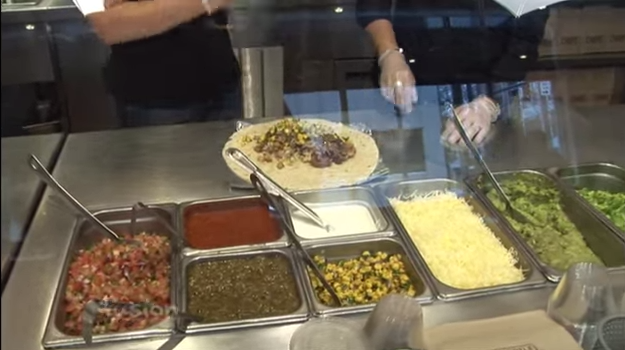No More GMOs: Chipotle Will No Longer Serve Genetically-Modified Food

The popular Mexican fast food restaurant that’s home to enormous (yet relatively healthy) burritos announced Monday that it will no longer be serving genetically-modified organisms (GMOs) in their food, making it the first national restaurant chain to only use non-GMO ingredients.
GMOs are plants or animals whose genomes have been changed by genetic engineering, with the aim of protecting foodstuffs like corn and soybeans from pests and diseases. While the intention behind GMOs may seem simple, controversy remains as to whether or not GMOs are harmful to human health. Many studies have shown they’re safe, and the Food and Drug Administration (FDA) claims they're harmless. But the jury is still out on the issue, and advocates have been calling for more research on them. The controversy has spurred certain food stores to avoid them and only serve local, organic products.
“There is a lot of debate about genetically modified foods,” Steve Ells, founder and co-chief executive of Chipotle, said in a statement. “Though many countries have already restricted or banned the use of GMO crops, it’s clear that a lot of research is still needed before we can truly understand all of the implications of widespread GMO cultivation and consumption. While that debate continues, we decided to move on non-GMO ingredients.”
The company did admit, however, that until they find alternatives, their beverages will continue to contain GMOs.
While a typical Chipotle burrito contains about 1,070 calories, which is well over half of the daily recommended intake of calories, the restaurant continues to make steps to improve the quality of its food to appease young, health-minded people. Other fast food restaurants, like McDonald’s, have been making strides in the past several years to clean up its act. America’s obesity epidemic continues to affect one-third of the adult population, and many place the blame on quick, easy, and cheap food.
“This is another step toward the visions we have of changing the way people think about and eat fast food,” Ells told The New York Times. “Just because food is served fast doesn’t mean it has to be made with cheap raw ingredients, highly processed with preservatives and fillers and stabilizers and artificial colors and flavors.”
Chipotle is truly a pioneer in the non-GMO arena, especially since going completely GMO-free can be pretty difficult. GMOs are embedded in many different types of food, including 90 percent of corn and soy grown in the U.S., soy oil, cornstarch, baking powder, preservatives, coloring agents, and vitamins. They’re also in corn meal and sugar. Whether other restaurants will follow their footsteps is yet to be seen.



























